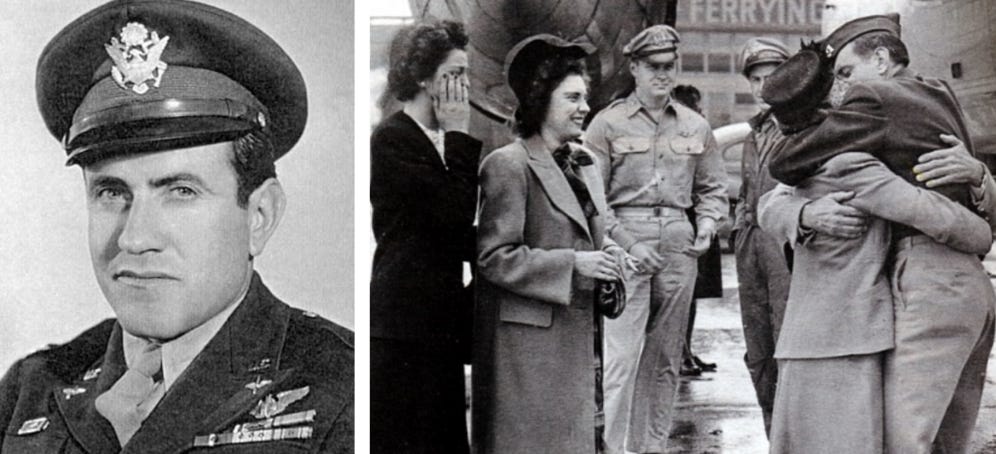The movie Unbroken provides a remarkable Christian message about suffering.
One who suffers for others always gets up, no matter how difficult.
The movie depicts the remarkable life of Louis Zamperini, who served in World War II and was an Olympic runner in the 1936 Berlin Olympics.
Louis Zamperini was born on January 26, 1917, and grew up in Olean, New York. His parents were from Italy and devoutly practiced the Catholic faith.
Louis was an interesting young fellow, often getting into trouble. This included fighting, drinking, and smoking. His parents struggled with his attitude and negative reputation, knowing it looked poorly on the entire family.
Then, something radically changed in Louis’ life. He found a passion…running.
Louis was a natural. He had stamina, endurance, and a unique ability to persevere through pain. Something powerful within him would be unleashed at the precise moment when others would quit.

Louis’ brother, Pete, saw this within him. There is a scene in the movie when Pete is training Louis and challenging him to persevere when running becomes difficult. Pete says, “If you can take it, you can make it.”
This phrase quickly becomes the heartbeat of Louis Zamperini. He suffers well. He endures pain. The moment he appears to be losing in a race, he battles back with remarkable stamina. There’s just something within him that gets unleashed when others quit.
Zamperini quickly learns, “If you can take it, you can make it.”
Louis represented the United States shortly after high school in the 1936 Berlin Olympics. As Hitler and others watched, Louis broke the record for the fastest lap in a 5,000-meter race. He represented his country well, taking 8th place. Zamperini was ready to prepare for the next Olympics, but the world quickly changed after Hitler invaded Poland in 1939.

Following the Pearl Harbor attack, the United States entered World War II. Louis served in the Air Force as a lieutenant. He was assigned to the Pacific Ocean as a bombardier on B-24 Liberators. His plane, due to a mechanical issue, crashed into the Pacific. Several of his members died in the accident. No one else knew of their location. The plane sank. They only had two small rafts. They were lost at sea.
His brother Pete’s words took on a new meaning - “If you can take it, you can make it.”
Louis Zamperini had to find a way to survive. Amazingly, Louis and another soldier named Russell survived on a raft for 47 days at sea. They survived storms, shark attacks, Japanese pilots shooting at them, and the constant problem of no food and no drink.
Then, a Japanese ship found them. Louis and Russell became prisoners of war.
His brother Pete’s words took on a new meaning - “If you can take it, you can make it.”
The Japanese quickly found out about Zamperini because of his Olympic background. The Japanese took pride in trying to crush his spirits before the other captured American soldiers. If they could crack Zamperini, they could diminish the spirits of every American around him.
Mutsuhiro Watanabe, a sergeant of the Imperial Japanese Army, looked to crush Zamperini. Watanabe’s tactics were to do whatever possible to diminish the hope of an American soldier.
Watanabe would hit Zamperini in the face with his stick, breaking his nose. He would say to Zamperini, “Don’t look at me. Don’t look at me. Don’t look at me.” Then, he would hit him in the face. Mutsuhiro Watanabe even lined up all of the American prisoners of war and had them each punch Louis Zamperini in the face.
Mutsuhiro Watanabe also publicly humiliated Zamperini by physically exhausting him. This included punching, kicking, and hitting him with a stick. Mutsuhiro saw how weak Zamperini was and then decided to race. With everyone watching, Zamperini raced a Japanese soldier. Of course, Zamperini couldn’t even finish the race. He fell to the ground in exhaustion, unable to move. The Olympic athlete was humiliated.
Mutsuhiro Watanabe made his point to the entire prisoner camp: Zamperini is no longer an Olympic athlete; he’s now a Japanese prisoner of war.
The Japanese understood suffering and pleasure. They offered Zamperini the opportunity to head into the city and speak on the radio. They then offered him beautiful lodging and fine dinners, only if he echoed on the radio what the Japanese wanted him to say.
Louis Zamperini had the opportunity to no longer suffer under the cruel Mutsuhiro Watanabe. Zamperini even looked across the cafeteria and saw American soldiers who were treated well because they had agreed to the Japanese deal. These men were laughing, well-fed, and healthy. Yet, something didn’t feel right with Zamperini.
Instead, Louis Zamperini chose to suffer with his fellow Americans in the prison camp.
Why did Zamperini choose to suffer instead of comfort and pleasure?
Louis Zamperini knew that his purpose in the war was to suffer for the men around him. He knew that his suffering gave hope to the prisoners of war around him. He knew that each hit to the face that he took from Mutsuhiro Watanabe was efficacious, meaning it made a difference in the lives of his brothers around him.
Louis Zamperini heard his brother’s words, “If you can take it, you can make it.”
The movie's most powerful scene depicts Mutsuhiro Watanabe pulling Zamperini away from his fellow soldiers. Watanabe desires to finally break the spirit of Zamperini and then kill him in front of everyone.
Watanabe shouts, “Pick up!” Zamperini then picks up a wooden plank and holds it on his shoulder. Watanabe screams, “Over your head!”
Then, Watanabe says to the guards surrounding Zamperini at gunpoint, “If he drops it, shoot him.”
The American soldiers now begin watching Zamperini hold this wooden plank above his head with Japanese soldiers at gunpoint. They see how long Zamperini can hold the wooden plank. They know how well he suffers. They also know how much Watanabe hates it.
Watanabe stares at Zamperini, waiting for his long-awaited victory. The American soldiers stop working, and all of them watch Zamperini.
You can hear some of the soldiers saying, “Come on, Louie.” “Go, Louie.” “You can do it, Louie.”
Louis Zamperini no longer looks down toward the ground. Instead, he stares at Watanabe. Zamperini has been here before; at that precise moment when others would quit, he gets a second wind. Something profound is unleashed within him—something only an Olympic athlete would have. Something only a survivor of 47 days at sea with shark attacks and storms would have. Something only a soldier who chooses a prisoner of war camp instead of a hotel room would have. Something only Louis Zamperini would have.
Zamperini’s demeanor changes. He stares at Watanabe with more energy, more hope. Zamperini then lifts the wooden plank into the air and shouts for all to hear. He continues shouting. The American soldiers love it. Watanabe is humiliated.
Watanabe says to Zamperini, “Don’t look at me. Don’t look at me.” Watanabe then runs over and beats Zamperini, ending the plank test. The American soldiers watch as Watanabe beats Zamperini to a pulp, hitting him with a wooden stick, punching his face, and kicking him.
In a remarkable turn of events, the one being beaten is victorious. The one on the ground and unable to move is the stronger one.
“Don’t look at me, don’t look at me” are the words of Watanabe to Zamperini, but there is a deeper, theological form of irony at play. Evil is defeated from the inside out. The suffering one victoriously gazes into the eyes of evil.
Notice that Zamperini defeats Watanabe on his turf—in the middle of the prison camp. God humbles Himself by becoming human in the person of Jesus and enters our world, knowing full well that it’s within the grasp of the evil one. As C.S. Lewis said, God entered clandestinely behind enemy lines in and through the person of Jesus. Like a prisoner of war, Jesus accepts the cross.
This is quite similar to Frodo Baggins destroying the ring in Mordor. The Christ figure always enters into the realm of sin and death to free others and attain victory. Evil is defeated behind enemy lines. We see this when Watanabe falls into exhaustion next to Zamperini, the Japanese prison camp's battleground.
Watanabe kneels next to Zamperini, which shows that he is emotionally and physically exhausted. Then, Watanabe looks around and realizes that every American soldier has been watching. Watanabe knows he just lost. The Americans see that Zamperini has defeated him. Watanabe is weak in the presence of Zamperini.
“If you can take it, you can make it.”
I would like to discuss one other line from the movie. Pete states to Louis as he boards the train for the Olympics, “A lifetime of glory is worth a moment of pain.”
Pete’s words are fundamentally Christian. They are a reminder of the Gospel when Jesus says, “If anyone wishes to come after Me, he must deny himself, and take up his cross and follow Me. For whoever wishes to save his life will lose it; but whoever loses his life for My sake will find it" (Matthew 16:24-25).
Pete is right; a lifetime of glory is worth a moment of pain.
The two phrases “If you can take it, you can make it” and “A lifetime of glory is worth a moment of pain” are Christian statements.
Zamperini is the Christ figure.
Zamperini is the one whose suffering leads to freedom and defeats the opponent. Although Zamperini expected to defeat the Japanese from the air on B-24 Liberators, he quickly realized that his purpose was to defeat them through suffering. Like Jesus Christ, Zamperini defeats the enemy on their turf and does so as a prisoner of war.
Fr. Ben Daghir


















